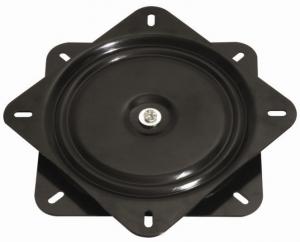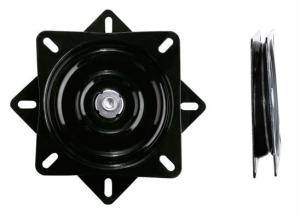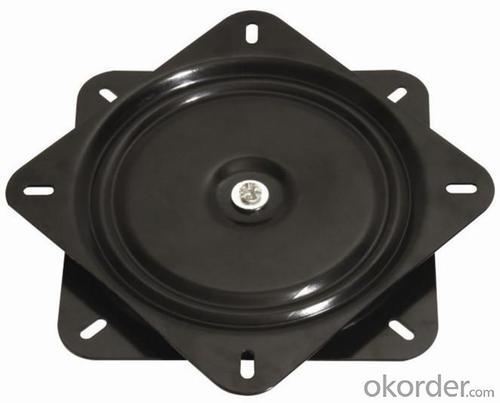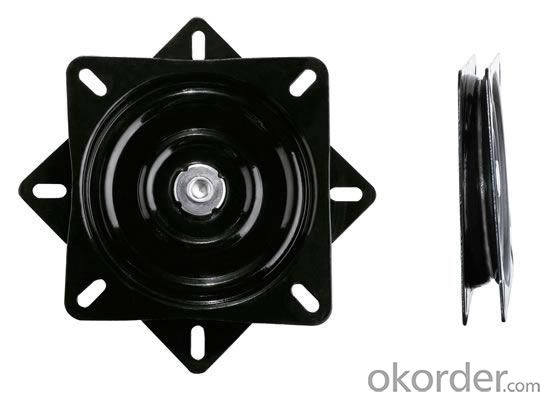Swivel Plates A-02
- Loading Port:
- China Main port
- Payment Terms:
- TT or LC
- Min Order Qty:
- 1000pcs pc
- Supply Capability:
- 40000 Pieces Per Month pc/month
OKorder Service Pledge
OKorder Financial Service
You Might Also Like
Quick Details of Swivel Plates A-02:
Type: Chair Mechanism,bar stool turntables Place of Origin: Guangdong, China (Mainland) Material: iron Net weight: 1.13kg/pcs (2.5mm) Height: 20-26mm Thickness: 2.0/2.5/3.0mm,2.0mm/2.5mm/3.0mm Certificate: SGS , Salt spray
Specifications of Swivel Plates A-02:
1.Size 158*158 mm
2.A3 steel plate
3.Color: black
4.Good MOQ and quickly delivery
5.Factory offer cheap price
Item No.: A04
Material : iron
Net weight : 1.13kg/pcs (Thickness=2.5mm)
packing size : 29*29*16.5cm
Pcs/ctn: 20 pcs
Product Photos:
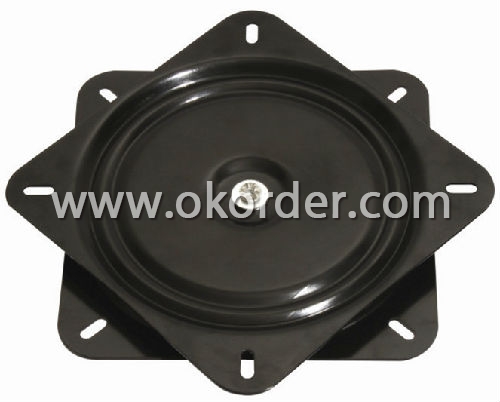
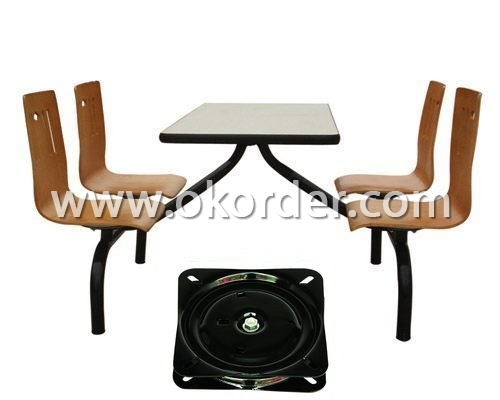
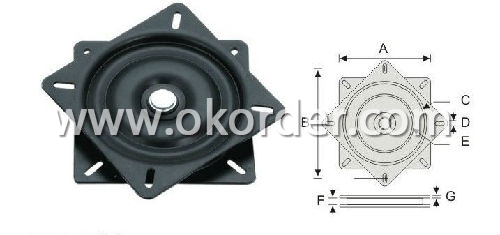
Packaging & Delivery:
Packaging Details: 20pcs/carton, size 29*29.16.5cm, GW: 23kg/ctn
Delivery Detail: 10 days after receive your 30% deposit for order
- Q: How does special steel contribute to the energy industry?
- Special steel plays a crucial role in the energy industry by providing high-performance materials that are essential for the construction and operation of various energy infrastructure. It is used in the manufacturing of turbines, generators, pipelines, and other components of power plants, helping to enhance their efficiency and reliability. Special steel's superior strength, corrosion resistance, and heat resistance properties make it suitable for withstanding the demanding conditions and extreme temperatures in power generation and transmission. Additionally, special steel is used in the production of renewable energy equipment such as wind turbines and solar panels, further contributing to the sustainable growth of the energy industry.
- Q: How does special steel contribute to the chemical processing industry?
- Special steel plays a crucial role in the chemical processing industry by offering a wide range of benefits that contribute to the overall efficiency and safety of various processes. Firstly, special steel is highly resistant to corrosion, which is an essential characteristic when dealing with corrosive chemicals. This resistance ensures that equipment and pipelines made from special steel can withstand the harsh chemical environments without deteriorating, leading to increased longevity and reduced maintenance costs. Furthermore, special steel provides excellent strength and durability, allowing it to withstand high temperatures and pressures commonly encountered in chemical processing. This strength ensures that equipment such as reactors, heat exchangers, and vessels can operate effectively under demanding conditions, minimizing the risk of failures or accidents. Special steel also offers excellent thermal conductivity, which is highly advantageous in heat transfer applications. This property allows for efficient heat exchange between different fluids, enhancing the overall energy efficiency of chemical processes. By facilitating the effective transfer of heat, special steel aids in optimizing the performance of equipment like condensers, boilers, and evaporators. In addition, special steel is often used in the construction of storage tanks and pipelines for the transportation and distribution of chemicals. Its high resistance to mechanical stress and impact makes it ideal for ensuring the safe containment and transportation of hazardous substances, reducing the risk of leaks or spills that could have serious environmental and safety consequences. Overall, the use of special steel in the chemical processing industry greatly contributes to the reliability, efficiency, and safety of various processes. Its corrosion resistance, strength, thermal conductivity, and durability make it an indispensable material for equipment and infrastructure, ensuring the smooth and secure operation of chemical processing plants.
- Q: What are the specific requirements for special steel used in the oil and gas sector?
- The specific requirements for special steel used in the oil and gas sector include high strength and corrosion resistance to withstand harsh environments, excellent fracture toughness to prevent failure under pressure, and resistance to hydrogen embrittlement. Additionally, it should have low temperature toughness for subzero conditions and be able to maintain its mechanical properties at elevated temperatures. The steel should also possess good weldability and be capable of withstanding cyclic loading and fatigue.
- Q: What are the factors to consider when selecting special steel for a specific application?
- When selecting special steel for a specific application, some important factors to consider include the required strength and hardness, corrosion resistance, temperature resistance, machinability, weldability, and cost. Other factors may include the desired surface finish, dimensional stability, availability, and any specific industry or regulatory requirements.
- Q: How is alloy steel used in the production of gears and shafts?
- Alloy steel is used in the production of gears and shafts due to its high strength and durability. By adding different alloying elements such as chromium, nickel, and molybdenum, the steel's properties can be enhanced to withstand heavy loads, high temperatures, and wear. This makes alloy steel ideal for manufacturing gears and shafts that need to transmit power, resist deformation, and maintain their integrity under demanding conditions.
- Q: Classification of special steel products
- Carbon steel, also called carbon steel, is an iron carbon alloy with a carbon content of less than 2% wc. Carbon steel, in addition to carbon, usually contains a small amount of silicon, manganese, sulfur and phosphorus.Carbon steels can be divided into three categories: carbon structural steel, carbon tool steel and free cutting structural steel by use. Carbon structural steel can be divided into two kinds of structural steel and machine building steel.
- Q: How does special steel contribute to the defense machinery industry?
- The defense machinery industry heavily relies on special steel due to its numerous advantages and contributions to the performance and durability of various defense equipment. To begin with, special steel possesses remarkable strength and toughness, making it ideal for manufacturing crucial components like armor plates, ballistic missiles, submarines, and tanks. These components need to withstand impact, penetration, and extreme conditions, all of which special steel can handle. This ensures the safety and protection of military personnel and assets. Additionally, special steel offers excellent corrosion resistance, a crucial characteristic for defense machinery used in harsh environments such as maritime operations or combat zones. Corrosion can weaken structures and compromise equipment functionality, but special steel's resistance helps maintain the integrity and longevity of defense machinery. This reduces maintenance costs and increases operational readiness. Furthermore, special steel enables the production of precision components with high dimensional stability, essential for advanced defense systems like aircraft, missiles, and radars. These components require exceptional accuracy and reliability to function optimally, and special steel's uniformity and consistency meet these demands. This ensures precise performance and enhances the overall capabilities of defense machinery. Moreover, special steel also contributes to weight reduction in defense machinery. As military equipment becomes more complex and technologically advanced, reducing weight while maintaining strength is crucial for enhancing mobility, fuel efficiency, and overall operational effectiveness. Special steel's high strength-to-weight ratio allows for the development of lighter defense machinery without compromising durability or protection. In conclusion, special steel's exceptional strength, corrosion resistance, dimensional stability, and weight reduction properties make it an indispensable material in the defense machinery industry. It enables the production of robust and reliable equipment, ensuring the safety and effectiveness of military operations and enhancing the overall capabilities of defense forces.
- Q: Can special steel be used in the recycling industry?
- Yes, special steel can be used in the recycling industry. Special steel, which is highly durable and resistant to corrosion, can be recycled and reused in various applications. It can be melted down and reprocessed to create new steel products, reducing the need for raw materials and minimizing waste in the recycling industry.
- Q: How does bearing steel contribute to the manufacturing of bearings?
- Bearing steel is a specific type of steel that offers high hardness, durability, and corrosion resistance, making it ideal for the manufacturing of bearings. The properties of bearing steel allow for the creation of strong and long-lasting bearing components that can withstand heavy loads, high temperatures, and intense rotational speeds. The steel's hardness helps to prevent wear and deformation, ensuring smooth and efficient bearing operation. Overall, bearing steel plays a crucial role in ensuring the reliability and performance of bearings in various industrial applications.
- Q: How does tool steel maintain its hardness at high temperatures?
- Tool steel maintains its hardness at high temperatures due to its high carbon content and the presence of alloying elements such as tungsten, molybdenum, and vanadium. These elements form carbides, which enhance the steel's ability to retain its hardness even under extreme heat. Additionally, the steel's fine grain structure and heat treatment processes contribute to its high temperature hardness retention.
1. Manufacturer Overview
| Location | Guangdong, China |
| Year Established | 1996 |
| Annual Output Value | US$ 5 to US$ 10 Million |
| Main Markets | 40.00% Domestic Market 10.00% Eastern Asia 10.00% Eastern Europe 8.00% Southeast Asia 8.00% South America 5.00% South Asia 5.00% Southern Europe 5.00% North America |
| Company Certifications | Test report for 3 section slide |
2. Manufacturer Certificates
| a) Certification Name | |
| Range | |
| Reference | |
| Validity Period |
3. Manufacturer Capability
| a) Trade Capacity | |
| Nearest Port | Shunde, Huangpu, Shenzhen |
| Export Percentage | 61% - 70% |
| No.of Employees in Trade Department | 3-5 People |
| Language Spoken: | English, Chinese, Spanish, Japanese |
| b) Factory Information | |
| Factory Size: | 1,000-3,000 square meters |
| No. of Production Lines | 3 |
| Contract Manufacturing | OEM Service Offered Design Service Offered Buyer Label Offered |
| Product Price Range | Average |
Send your message to us
Swivel Plates A-02
- Loading Port:
- China Main port
- Payment Terms:
- TT or LC
- Min Order Qty:
- 1000pcs pc
- Supply Capability:
- 40000 Pieces Per Month pc/month
OKorder Service Pledge
OKorder Financial Service
Similar products
Hot products
Hot Searches
Related keywords
